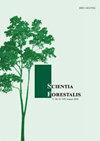Compostos presentes em óleo essencial de folhas de eucalipto podem ter relação com a resistência/suscetibilidade ao percevejo bronzeado (Thaumastocoris peregrinus)
IF 0.4
4区 农林科学
Q4 FORESTRY
引用次数: 1
Abstract
Bronze bug is one of the main eucalyptus cultivation pests worldwide. Even with so much damage, current control methods may not be suitable for all growing regions. However, it is possible to find some resistant genotypes to this insect in the field. Considering that some plants produce bioactive compounds which are antagonistic or attractive to insects, essential oils from Eucalyptus spp. clones’ leaves, resistant and susceptible to the bronze bug, were extracted and characterized. A total of 117 different compounds were found. Among these, 30 compounds showed some type of expression of interest. The presence of some compounds may be responsible for the resistance or attractiveness to T . peregrinus attack. The results are presented and discussed below.桉树叶精油中的化合物可能与对黑臭虫(Thaumastocoris peregrinus)的抗性/敏感性有关。
铜蝽是世界范围内桉树栽培的主要害虫之一。即使有如此严重的危害,目前的控制方法可能并不适用于所有的种植区。然而,有可能在田间发现一些对这种昆虫具有抗性的基因型。考虑到某些植物产生的生物活性物质对昆虫具有拮抗或吸引作用,本文从对铜虫具有抗性和敏感性的桉树无性系叶片中提取精油并进行了表征。总共发现了117种不同的化合物。其中,30个化合物表现出某种感兴趣的表达。一些化合物的存在可能是对T的抗性或吸引力的原因。peregrinus攻击。结果将在下面提出和讨论。
本文章由计算机程序翻译,如有差异,请以英文原文为准。
求助全文
约1分钟内获得全文
求助全文
来源期刊

Scientia Forestalis
Agricultural and Biological Sciences-Forestry
CiteScore
1.00
自引率
0.00%
发文量
39
期刊介绍:
Scientia Forestalis is a scientific publication of the IPEF – Institute of Forest Research and Studies, founded in 1968, as a nonprofit institution, in agreement with the LCF – Department of Forest Sciences of the ESALQ – Luiz de Queiroz College of Agriculture of the USP – São Paulo University. Scientia Forestalis, affiliated to the ABEC – Brazilian Association of Scientific Publishers, publishes four issues per year of original papers related to the several fields of the Forest Sciences.
The Editorial Board is composed by the Editor, the Scientific Editors (evaluating the manuscript), and the Associated Editors (helping on the decision of acceptation or not of the manuscript, analyzed by the Peer-Reviewers.
 求助内容:
求助内容: 应助结果提醒方式:
应助结果提醒方式:


